NIASRA runs a variety of events and seminar series open to academics, students and the community to attend.
Events & seminars
Upcoming events
There are currently no events for this period
Annual Data Science and Statistics Lecture
in the School of Mathematics and Applied Statistics
The Data Science and Statistics Lecture (DSSL) began in 2018 as the Statistical Science Lecture, becoming the DSSL in 2023. It is an annual event made possible by a philanthropic donation to the School of Mathematics and Applied Statistics, University of Wollongong.
Data Science rose to prominence in the 2010s in response to the 21st Century's digital revolution and the presence of Big Data in science and society. Statistics holds a critical place in Data Science; it is the principled collection, analysis, and interpretation of data, taking into account the uncertainties within and between each of these steps. It gives scientists, including data scientists, the ability to weigh evidence appropriately and find signals in the noise. The annual Data Science and Statistics Lecture showcases the interdisciplinarity and key role statistics plays in extracting scientific knowledge from data in the presence of uncertainty.
The 2024 Data Science and Statistics Lecturer
Christopher K. Wikle
Distinguished Professor and Chair of the Department of Statistics at the University of Missouri (MU), with additional appointments in Soil, Environmental and Atmospheric Sciences and the Truman School of Public Affairs.
He received a PhD co-major in Statistics and Atmospheric Science in 1996 from Iowa State University. He was research fellow at the National Center for Atmospheric Research from 1996-1998, after which he joined the MU Department of Statistics.
His research interests are in spatial and spatio-temporal statistics applied to environmental, ecological, geophysical, agricultural and federal survey applications, with particular interest in dynamics. His work has been concerned with formulating computationally efficient deep hierarchical Bayesian models motivated by scientific principles, with more recent work at the interface of deep neural models in machine learning.
Awards include elected Fellow of the American Association for the Advancement of Science (AAAS), American Statistical Association (ASA), Institute of Mathematical Statistics (IMS), and the International Statistical Institute (ISI). Additional awards include Distinguished Alumni Award from the College of Liberal Arts and Sciences at Iowa State University, ASA Environmental (ENVR) Section Distinguished Achievement Award, J. Stuart Hunter Award/Lecture, International Environmetrics Society (TIES), co-awardee 2017 ASA Statistical Partnership Among Academe, Industry, and Government (SPAIG) Award, the MU Chancellor’s Award for Outstanding Research and Creative Activity in the Physical and Mathematical Sciences, the Outstanding Graduate Faculty Award, and Outstanding Undergraduate Research Mentor Award at the University of Missouri. His book Statistics for Spatio-Temporal Data (co-authored with Noel Cressie) was the 2011 PROSE Award winner for excellence in the Mathematics Category by the Association of American Publishers and the 2013 DeGroot Prize winner from the International Society for Bayesian Analysis. His latest book, Spatio-Temporal Statistics with R, with Andrew Zammit-Mangion and Noel Cressie, was published in 2019 and won the 2019 Taylor and Francis award for Outstanding Reference/Monograph in the Science and Medicine category.
Dr. Wikle is Associate Editor for several journals and is one of six inaugural members of the Statistics Board of Reviewing Editors for Science.
Data Science and Statistics Lecture given on 30 October 2024:
The Ship Has Sailed: Where Should we Steer It? (Climate Adaptation needs Uncertainty Quantification)
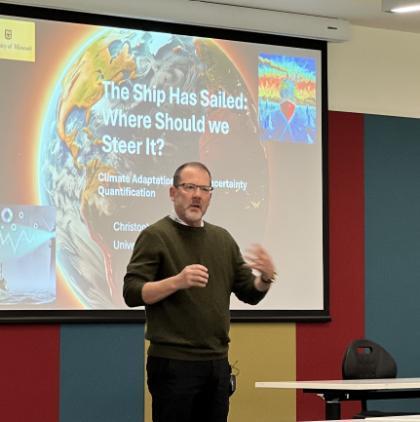
Christopher K. Wikle
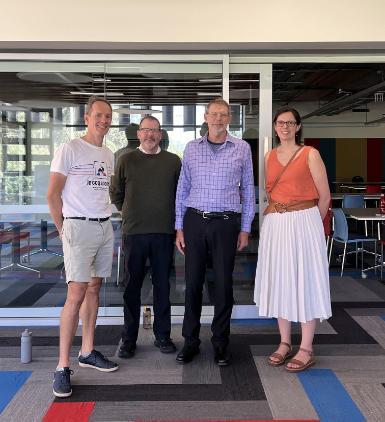
Nicolas Flament (EF), Chris Wikle, Noel Cressie (NIASRA), and Dominique Tanner (EF)
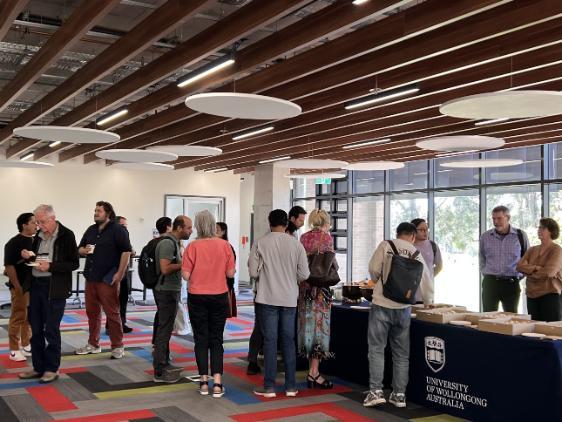
DSSL Reception
The 2023 Data Science and Statistics Lecturer
Antonietta Mira
Professor of Statistics and Director of the Data Science Lab at Università della Svizzera Italiana, Lugano, Switzerland
Professor of Statistics at Insubria University, Como, Italy.
Antonietta Mira is Professor of Statistics at Università della Svizzera Italiana, Lugano, Switzerland and at Insubria University, Como, Italy.
She is a Fellow of the Institute of Mathematical Statistics, the International Society for Bayesian Analysis, and the Istituto Lombardo Academy of Science and Letters.
Antonietta is extremely active in the profession through the publication of her research in top journals; keynote presentations at international conferences and service on their scientific committees; editorial board membership of leading journals; and Principal Investigator of prestigious competitive research grants.
Winning awards for excellence in both research and teaching, Antonietta has been involved in public engagement (such as EXPO Milano 2015) and has delivered public lectures (such as Festival of the Swiss Academy of Sciences 200 Year Anniversary).
She is often interviewed in the media on topics related to Data Science and Big Data, and she has created an exhibit, Numbed by Numbers!, which is a 3D tour between Digits (maths), Dice (probability), and Data (stats), aimed at children aged from 6–18. She is also winner of the 2022 G. Dosi national prize for popularising science for STEM students, with publication of her book with A. Massarenti, "The Data Pandemic. Here is the Vaccine" (2020, Mondadori).
In her free time, Antonietta is a practicing magician with a special interest in mathematical magic, which is presented in her book with V. Bossi and F. Arlati, "Mate-Magica" (2012, Aboca).
Data Science and Statistics Lecture given on 16 August 2023:
Data science for public health: Risk mapping of Out of Hospital Cardiac Arrest and the optimal deployment of defibrillators
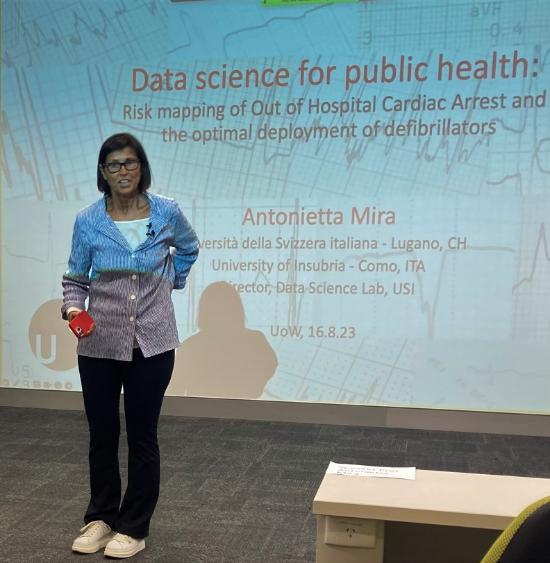
2023 lecture: Antonietta Mira
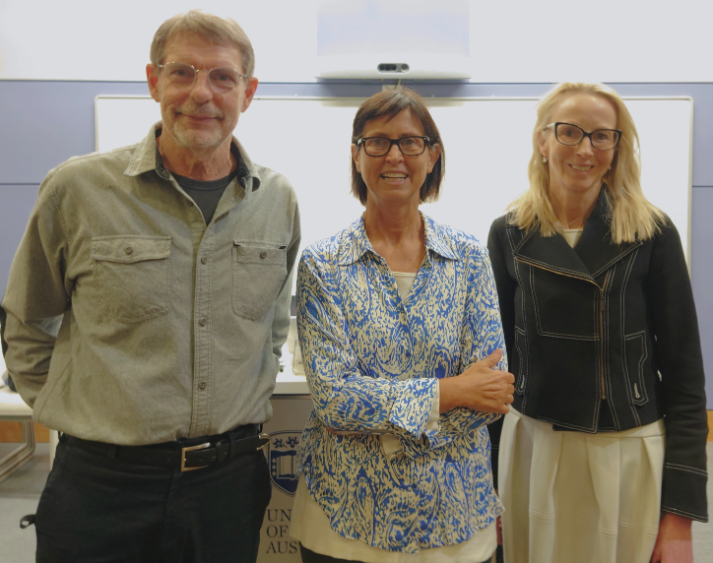
Noel Cressie, Antonietta Mira, Marijka Batterham
The 2022 Statistical Science Lecturer
Michael I. Jordan
Pehong Chen Distinguished Professor in Dept of Electrical Engineering and Computer Sciences and Professor of Statistics, UC Berkeley, USA
Michael I. Jordan is the Pehong Chen Distinguished Professor in the Department of Electrical Engineering and Computer Science and the Department of Statistics at the University of California, Berkeley. He received his Master’s in Mathematics from Arizona State University and earned his PhD in Cognitive Science in 1985 from the University of California, San Diego. He was a professor at MIT from 1988 to 1998. His research interests bridge the computational, statistical, cognitive, biological, and social sciences. In 2016, Prof. Jordan was named the "most influential computer scientist" worldwide in an article in Science, based on rankings from the Semantic Scholar search engine. Prof. Jordan is a Member of the National Academy of Sciences, the National Academy of Engineering, the American Academy of Arts and Sciences, a Fellow of the American Association for the Advancement of Science, a Foreign Member of the Royal Society, UK, and a Fellow of a broad range of societies. He received the World Laureates Association Prize (2022), the Ulf Grenander Prize from the American Mathematical Society (2021), the IEEE John von Neumann Medal (2020), the IJCAI Research Excellence Award (2016), the David E. Rumelhart Prize for contributions to human cognition (2015), and the ACM/AAAI Allen Newell Award (2009).
Statistical Science Lecture given on 17 November 2022:
On Learning-Aware Mechanism Design
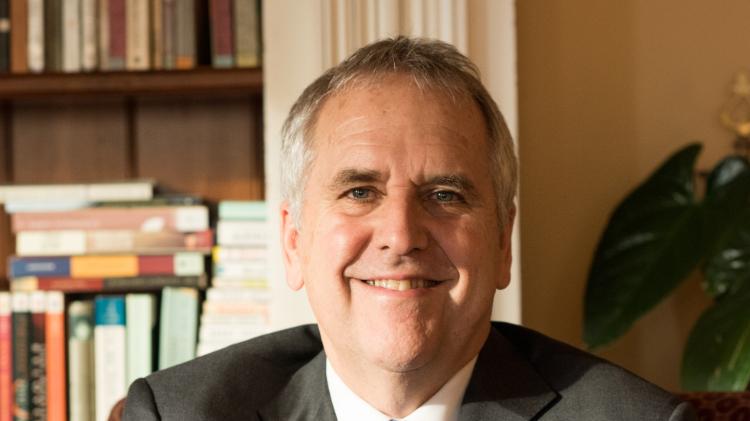
2022 Statistical Science Lecturer Michael I. Jordan
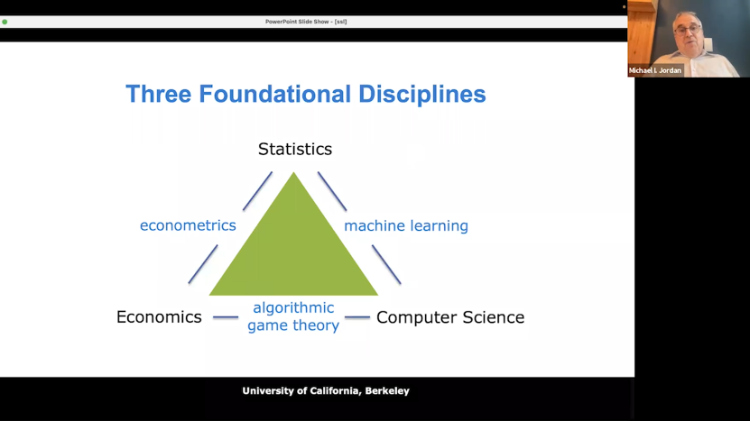
2022 Statistical Science Lecture highlight 1: "Three Foundational Disciplines"
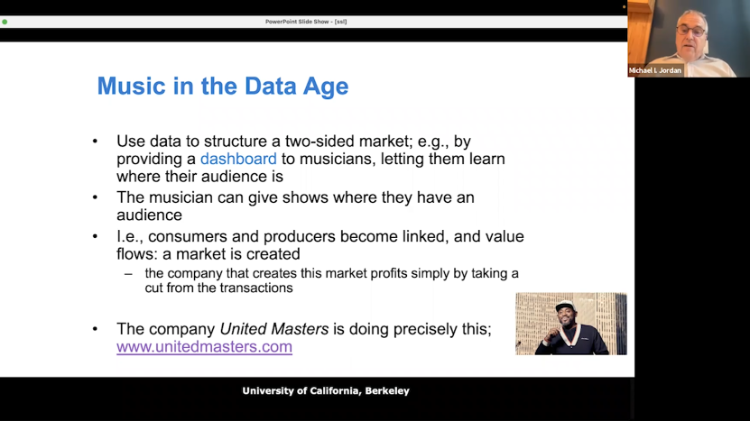
2022 Statistical Science Lecture highlight 2: "Music in the Data Age"
The 2021 Statistical Science Lecturer
Scott L. Zeger
John C. Malone Professor of Biostatistics and Medicine
The Johns Hopkins University Bloomberg School of
Public Health and School of Medicine,
Baltimore, USA
Scott L. Zeger is The Johns Hopkins University’s co-Director of Hopkins in Health, the Johns Hopkins precision medicine partnership of the University, Health System, and Applied Physics Laboratory. He conducts statistical research on regression analysis for correlated responses and on methods for precision medicine. He has made substantive contributions to our understanding of the effects on health of smoking and air pollution, the global etiology of children’s pneumonia, and other topics. Dr. Zeger’s work has been recognized with several awards including most recently an honorary doctorate from Lancaster University in England and the 2015 Karl Pearson Prize from the International Statistical Institute with Kung-Yee Liang for their development of Generalized Estimating Equations (GEE). Dr. Zeger is most proud of his Golden Apple Awards from the Johns Hopkins Bloomberg School Student Assembly, for excellence in teaching.
Statistical Science Lecture given on 3 November 2021:
Saving Medical Dollars, Trillions at a Time: A Statistical Perspective

2021 lecture: Scott L. Zeger
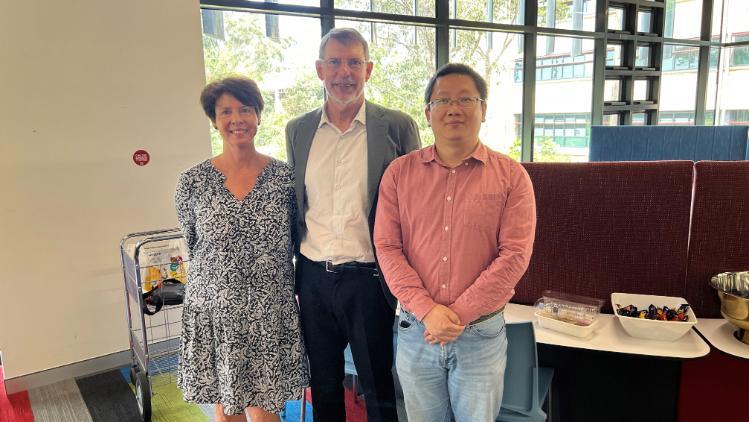
2021 Statistical Science Lecture organisers: Karin Karr, Noel Cressie, Yi Cao (from left to right)
The 2020 Statistical Science Lecturer
Sally Cripps
Professor, University of Sydney, Australia
Sally Cripps is a Professor of Mathematics and Statistics and Director of the ARC Centre in Data Analytics for Resources and Environments (DARE Centre), at the University of Sydney. Sally’s research focus is the development of new and novel probabilistic models which are motivated by the need to solve an applied problem with the potential for impact. She has particular expertise in the use of mixture models for complex phenomena, modelling longitudinal data, nonparametric regression, the spectral analysis of time series, and the construction of transition kernels in MCMC schemes that efficiently explore posterior distributions of interest. Sally is also Chair of the International Society for Bayesian Analysis’ section, Bayesian Education and Research in Practice.
Statistical Science Lecture given on 18 November 2020:
Zen and the Art of Bayesian Geology/Hydrology/Ecology
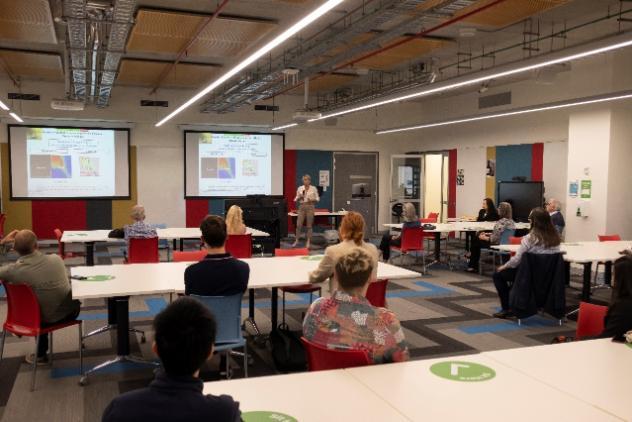
2020 lecture: Sally Cripps
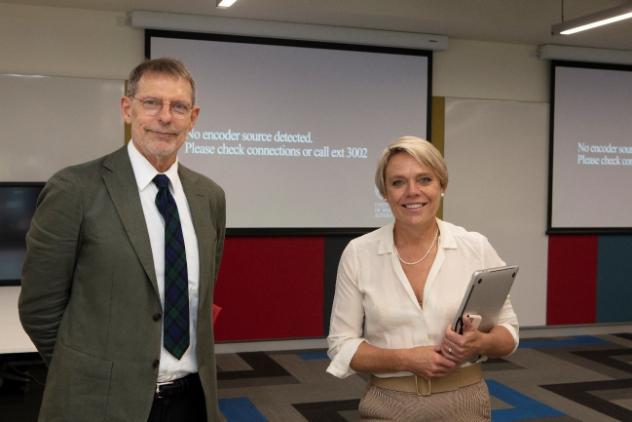
Noel Cressie, Sally Cripps
The 2019 Statistical Science Lecturer
Peter J Diggle
Distinguished Professor, Lancaster University and Health Data Research UK
Peter Diggle is a Distinguished University Professor of Statistics in the Centre for Health Informatics, Computing and Statistics, a teaching and research group within the Lancaster Medical School at Lancaster University working at the interface of statistics, epidemiology, and health informatics. Peter is also Director of Training at Health Data Research UK, working with academic institutions across the UK to draw up a training strategy that builds on existing best practice to create a programme that will transform the careers of future leaders in data science on a national scale. He holds adjunct positions at the Johns Hopkins University, Yale and Columbia Universities, and he was President of the Royal Statistical Society between July 2014 and December 2016.
Statistical Science Lecture given on 6 November 2019:
A Tale of Two Parasites: statistical science to support disease control programmes in Africa
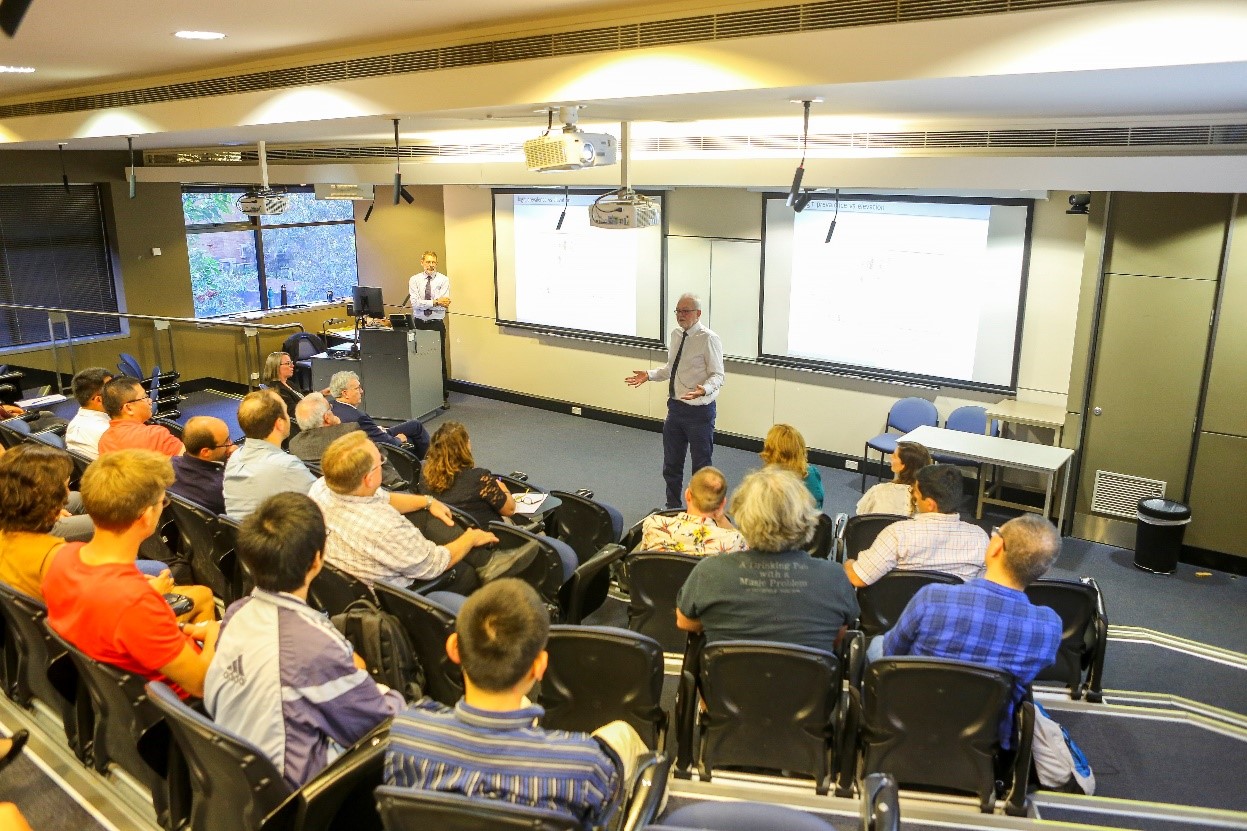
2019 lecture: Peter Diggle
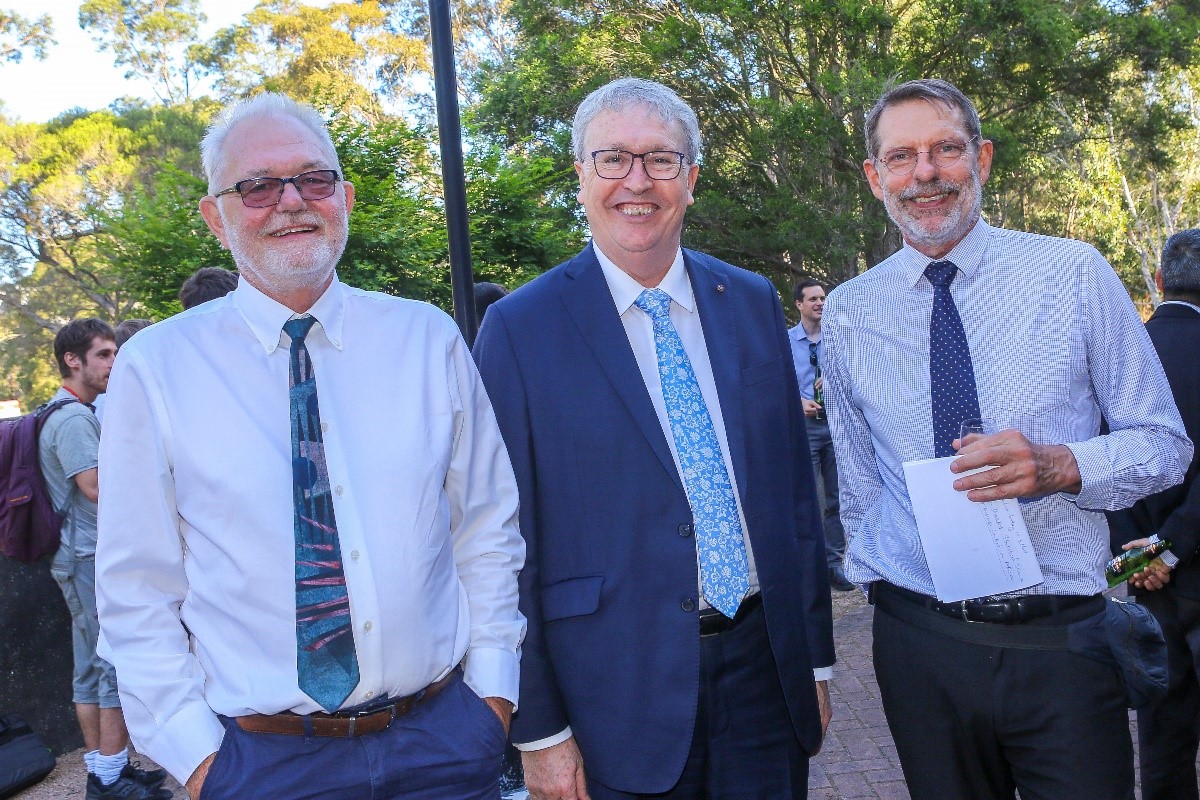
Peter Diggle, V-C Paul Wellings, Noel Cressie
The 2018 Statistical Science Lecturer
Renate Meyer
Professor, The University of Auckland, New Zealand
Renate Meyer is a Professor in the Department of Statistics at The University of Auckland, with research interests in applied Bayesian inference and MCMC methods. In particular, her research areas comprise time series analysis with applications in astrophysics (gravitational waves), state-space modelling in ecology, multivariate modelling using copulas, survival analysis in medical statistics, and stochastic volatility models for financial time series.
Statistical Science Lecture given on 31 October 2018:
Surfing Gravitational Waves: Black holes and Bayesian nonparametrics
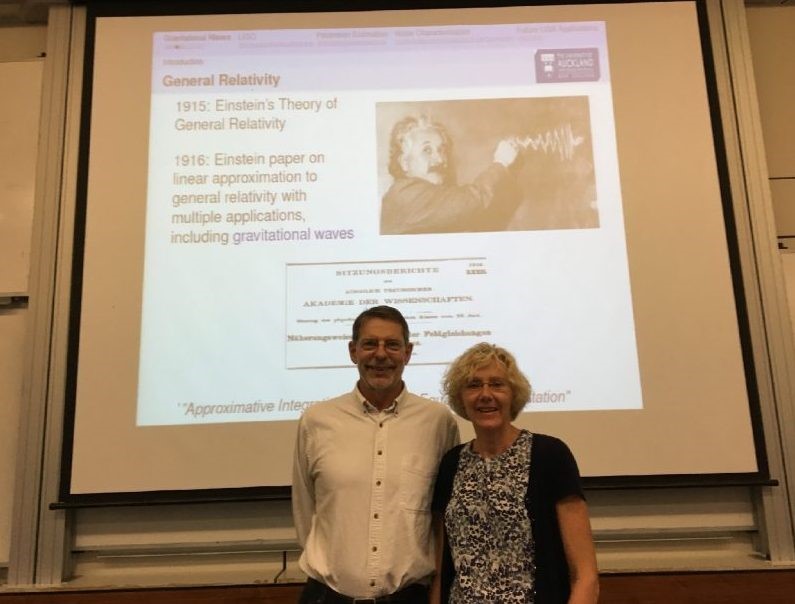
Noel Cressie, Renate Meyer
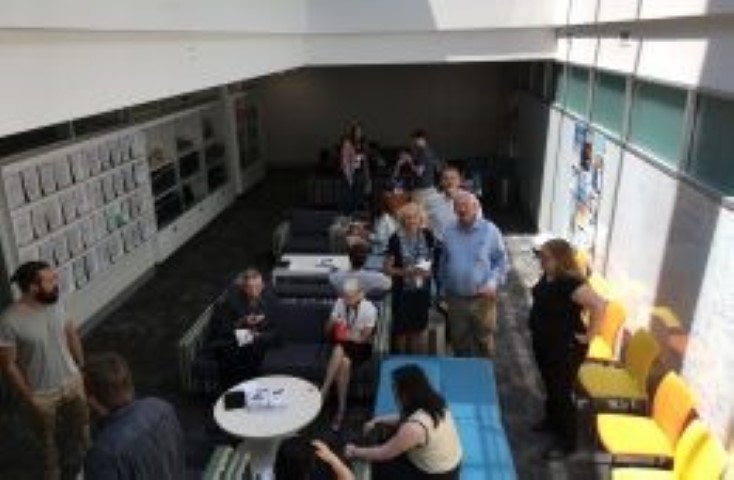
SMAS morning tea with Renate Meyer